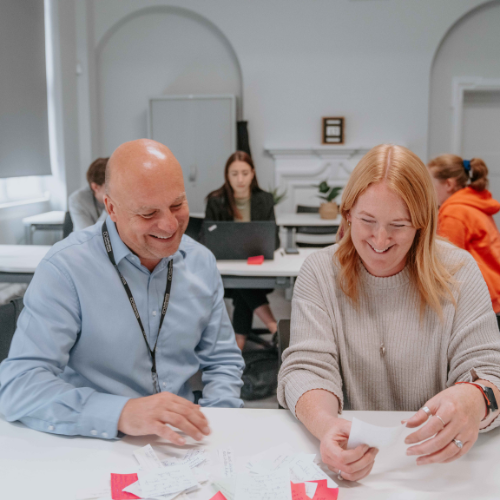Emily says: “The most rewarding aspect of my role as a Senior Change Manager is the opportunity to witness and be a part of positive transformations across our organisation.“
How does a normal day start? With getting the kids off to school and then, if time allows, I like to get out for a walk with my dogs.
What is your role? I’m responsible for designing and delivering transformation projects for the council.
As a Senior Change Manager I provide senior support to the Change Managers who are working on projects in my area – so acting as an escalation point and providing support to troubleshoot any risks or issues that are emerging. I also line manage two change managers so another important aspect of my role Is supporting them and working with them on any personal development objectives.
During any downtime, I invest time staying up to date on industry trends, reading relevant articles, or completing online courses and webinars. I think this is really important because continuous learning helps me stay ahead and bring fresh perspectives to my work.
After a productive day of work, I transition back to the role of a parent. I pick up my kids from school have some quality family time, whether it’s helping them with homework, preparing meals together, or playing outside in the garden.
Why did you join Staffordshire County Council? I wanted to work in a role where I could use my skills to make a positive impact.
What might people not know about working in the council? The council offers flexible work arrangements that enable me to split my time between home life and work life to suit my family.
What does your typical day look like? Due to the nature of my job my typical day is very varied. Some days can be very meeting heavy with it being such a collaborative role. I could be in project or programme board meetings or facilitating workshops or brainstorming sessions too. In between meetings I might be preparing presentations, drafting a business case or conducting some research.
What is your most memorable moment? When the first automated process went live for my Robotic Process Automation project – very geeky but exciting!
What is the worst part of your job? One of the more challenging aspects of my role as a Senior Change Manager is navigating complex stakeholder dynamics. In the course of my work, I often encounter differing opinions, resistance to change, and varying levels of engagement from stakeholders. This can make it difficult to maintain alignment and ensure that all parties are on board with change initiatives. However, I see this challenge as an opportunity for growth. It has pushed me to develop stronger communication, negotiation, and conflict resolution skills.
I’ve also learned the importance of active listening and empathy when dealing with stakeholders with varying perspectives. While it can be demanding, this aspect of my job has ultimately allowed me to become a more effective change manager.
What is the best part of your job? The most rewarding aspect of my role as a Senior Change Manager is the opportunity to witness positive transformations across our organisation. Over the past year, I’ve had the privilege of leading a project aimed at streamlining our internal processes. Seeing the team’s dedication and hard work translate into real efficiencies has been incredibly gratifying. Not only did we meet our project goals, but we also improved employee morale, as they can now focus on more meaningful tasks.
What would you be doing if you didn’t work here? I’d like to explore a career in project management or business consulting.
What advice would you give someone considering a career in change management? Continuously invest in your knowledge and skills, learn from others and always remember the person being impacted by the change!


